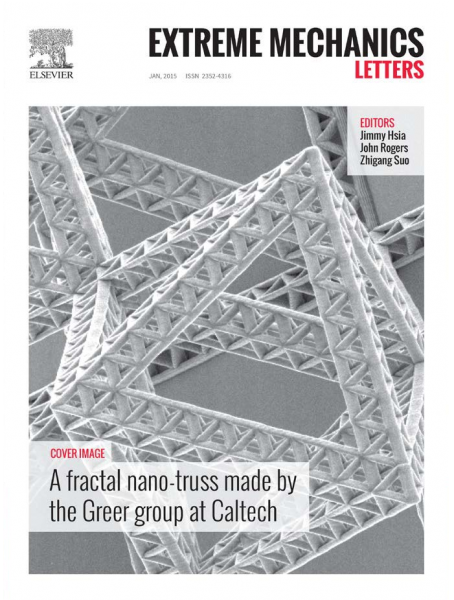 |
 Elsevier recently appointed Mechanical Engineering Associate Professor Teng Li to be an Associate Editor of Extreme Mechanics Letters (EML). EML is an Elsevier journal publishing letter-sized, original research highlighting the role of mechanics in advancing fields vital to society such as health science, energy systems, the environment, food and water, climate and security. Elsevier is a world leading academic publisher of scientific, technical and medical literature. Elsevier recently appointed Mechanical Engineering Associate Professor Teng Li to be an Associate Editor of Extreme Mechanics Letters (EML). EML is an Elsevier journal publishing letter-sized, original research highlighting the role of mechanics in advancing fields vital to society such as health science, energy systems, the environment, food and water, climate and security. Elsevier is a world leading academic publisher of scientific, technical and medical literature.
The last two decades have seen extremely rapid advances at the forefront of applied sciences. In particular, fields such as micro and nanotechnologies, biotechnologies, soft materials, smart sensing/actuation, manufacturing and device fabrication have been propelled by their promising applications in a wide range of fields including materials science, biology and energy systems, to name a few. However, future success in these applications depends on addressing fundamental scientific challenges at small scales, many of which have their origins in the mechanics of micro and nanostructures and materials. Numerous problems encountered in the development of the forefront of applied sciences highlight the important role of mechanics. The diversified and enriched roles of mechanics scattered in emerging micro- and nano-structured materials, biological materials and energy systems have attracted growing attentions of not only mechanicians, but also materials scientists, biologists, physicists and chemists.
Research advances in new frontiers call for a platform that facilitates rapid communications on mechanics research, not only for the mechanics community, but also for a wide range of other disciplines that can contribute and benefit. A letter-sized journal on mechanics focusing on the forefront of applied sciences can serve as a platform for the most up-to-date developments in mechanics.
“Despite the availability and huge success of many letter-sized journals in other disciplines, such as Nano Letters, ACS Nano, Physical Review Letters and Applied Physics Letters, there exists clear and strong needs for a letter-sized journal on mechanics to communicate the rapid advances of research in micro and nano-mechanics and materials science to broad research communities,” explains Li.
EML enables rapid communication of research that highlights the role of mechanics in multi-disciplinary areas across materials science, physics, chemistry, biology, medicine and engineering, and covers experimental, theoretical and computational mechanics of processes at all size and time scales. Emphasis is on the impact, depth and originality of new concepts, methods and observations at the forefront of applied sciences. The goal is to have the papers published online within 6-8 weeks upon submission.
“In the long run, EML will not only serve as a window for mechanics to reach out to other communities, but also promote and enhance the growth and reputation of the next generation of mechanicians in broader scientific communities,” says Li.
Related Articles:
Li and Hu Awarded NSF Grant to Study Challenges in Creating Materials that are Both Stronger and Tougher
UMD Researchers Use a Simple Stretch to Create Powerful Pseudomagnetic Fields in Graphene
Li Awarded Society of Engineering Science Young Investigator Medal
Six Mechanical Engineering Students Selected for 2013 Future Faculty Program
Bringing Mechanicians Together Through iMechanica.org
Associate Professor Teng Li Wins E. Robert Kent Outstanding Teaching Award
December 3, 2014
|

